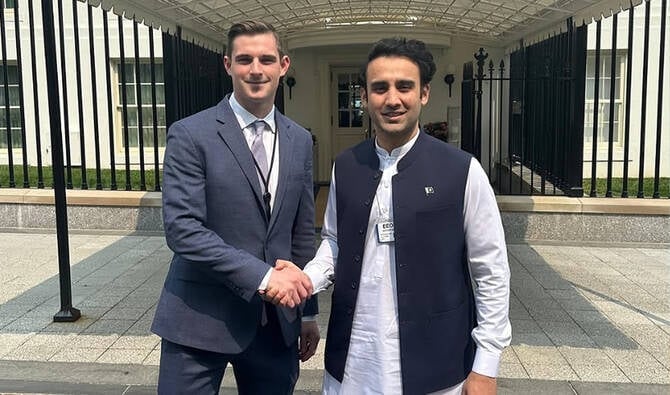ISLAMABAD – Pakistan’s State Minister for Crypto and Blockchain, Bilal bin Saqib, has held a key meeting with Bo Hines, adviser to US President Donald Trump on digital assets, to explore avenues for bilateral cooperation on crypto policy and legislation.
The meeting, confirmed by the Pakistani finance ministry on Friday, reflects Pakistan’s growing ambition to position itself as a leading Web3 innovation hub in the region.
Web3, a decentralized version of the internet based on blockchain, enables users to control their data and assets through peer-to-peer networks and smart contracts. Unlike Web2 platforms dominated by tech giants like Google and Facebook, Web3 promotes transparency and user ownership through decentralized apps such as NFTs and DAOs.
The meeting follows a landmark U.S.-Pakistan trade agreement, which included reduced tariffs and a strategic partnership to develop Pakistan’s oil reserves. According to the finance ministry, the conversation between Saqib and Hines centered on the global coordination of crypto regulations and Pakistan’s roadmap for advancing digital asset technologies.
“This alignment sends a strong signal: Pakistan and the US are moving beyond traditional trade ties to explore joint efforts in digital asset legislation,” the ministry said.
Their discussions came just a day after the U.S. launched its Digital Asset Framework, aimed at shaping a global regulatory model for digital assets. Saqib and Hines previously met in June at the White House to align strategies on decentralized technologies, regulatory harmonization, and youth-driven innovation.
Although cryptocurrencies such as Bitcoin are not banned in Pakistan, they remain unregulated, and the State Bank of Pakistan has yet to authorize any trading platforms. To address this gap, Islamabad launched the Pakistan Crypto Council (PCC) in March, appointing Binance co-founder Changpeng Zhao as its strategic adviser.
In April, Pakistan introduced its first official policy framework for virtual assets and service providers, designed to align with the FATF’s compliance and integrity standards. The country’s broader digital asset strategy includes allocating 2,000 megawatts of surplus power for Bitcoin mining and AI data centers—an effort to transform excess energy into economic growth, employment, and infrastructure development.














